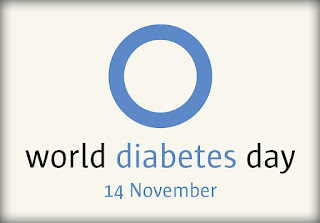Hey there! How have you been. It's been a while eh? Sorry about that! Life, the universe, and everything. You know how it goes.
So this isn't the blog post I've been meaning to write about TBR hacks for the tSlim running Control IQ. It's not even the one about seeing if I can get funding for sensors, which I seem to be being promised, but which hasn't quite happened yet.
If those are of any interest, do let me know and I will try to get around to them. Honest!
No. Instead this is a little unexpected ponder I had earlier, when realising that it was WDD once again, as I saw lots of other more capable awareness-raising diabetes types sharing stuff on their social feeds. It came unbidden. And rather surprised me - so here it is...
"Wow. Diabetes has really changed since we started the blog!"
There. That's it. Groundbreakingly insightful as always.
But much as diabetes is still Very Annoying (TM), a bit of a drag, occasionally utterly terrifying, frequently exhausting, but on the whole relatively manageable most of the time... there have been some pretty big changes in the decade or more that I've been rambling semi-coherently on here.
Back then, Twitter (for diabetes types) was a sort of a cosy coffee shop. A place to connect with a few like-minded folk who were also, coincidentally pancreatically challenged (thanks ShootUp), and chat about something and nothing. Now it's not even Twitter any more!
Once 'low carb' to help managing T2 was viewed as some sort of crazy, lunatic idea and positively discouraged by pretty much all healthcare professionals. Now it's seen as a fairly mainstream management approach that works really well for some people, and is often mentioned by practice nurses from the very beginning. This was once unthinkable on the forums I was frequenting when I first started comparing notes with other people with diabetes. There are now whole NHS GP practices championing the approach, and even established NHS programmes to help people who want to give it a go.
When we started writing this blog, as far as the scientific and medical world was concerned T2 diabetes was an inevitably progressive condition (hardly a phrase that encourages self management!). You got it, and then it gradually got worse and worse, and needed more and more meds, until you expired either from it or from something related to it. Now thanks to the DIRECT trial, there is high quality evidence that many with T2 can get their diabetes in remission (keeping HbA1c below 48mmol/mol with no medication) though significant weight loss. And many folks who choose a low carb approach can achieve the same remission criteria too. And this that remission can be maintained for many years.
There are a bunch of fancy new insulins and meds available now too. Including some that could potentially prove complete transformative for people who struggle with overweight and obesity.
Way back in 2010, CGM was almost unheard of outside of the US. I was even invited to a thing where the company developing a product wanted to know whether or not many people in the UK had even heard of the idea. At the time the chance of getting a CGM funded in the UK was vanishingly small. But a torrent of advocacy effort, an expectation defying Prof, and a flurry of new technologies and options later, and now over 90% of people with T1 in the UK have access to funded full time CGM.
They are now embarking on the same transformation for Hybrid Closed Loops (where an insulin pump and CGM talk to each other and are able to make some gentle adjustments to help us out).
The pace of change is extraordinary. And it doesn't seem to be slowing down.
Plus in the background really quite staggering progress is being made with stem cell research and other avenues, edging ever closer to a possible cure.
I'm really hoping that some progress can be made around reducing diabetes stigma. And especially in increasing access to appropriate monitoring technology for those people with T2 who would value it and benefit from it. Possibly even a little sub-division of the T2 umbrella, so that more appropriate options can be offered to the different sub-types, rather than a blanket 'No' to so many people.
So cheers to old Fred Banting. And Charlie Best, and all the others. There really has never been a better time to have diabetes.
And maybe, just maybe, someday soon, nobody will.

